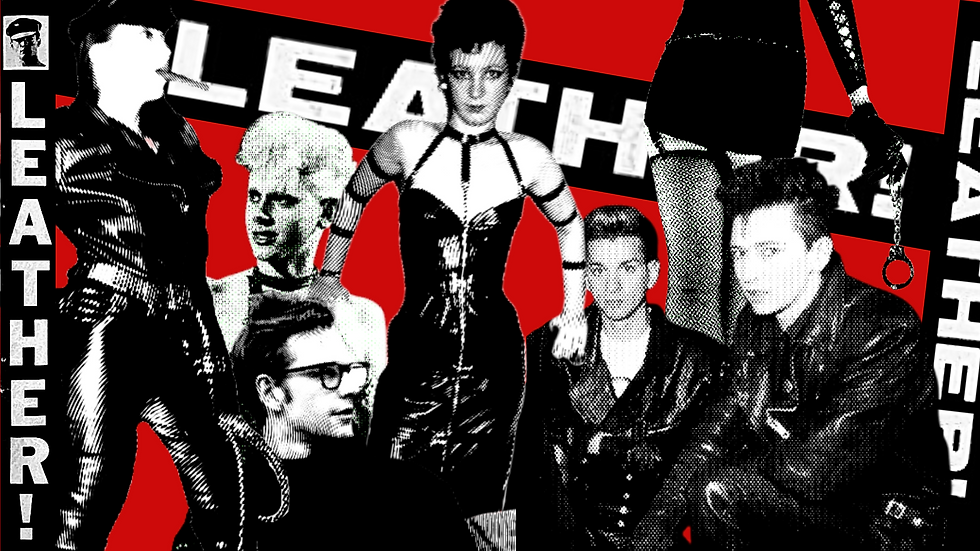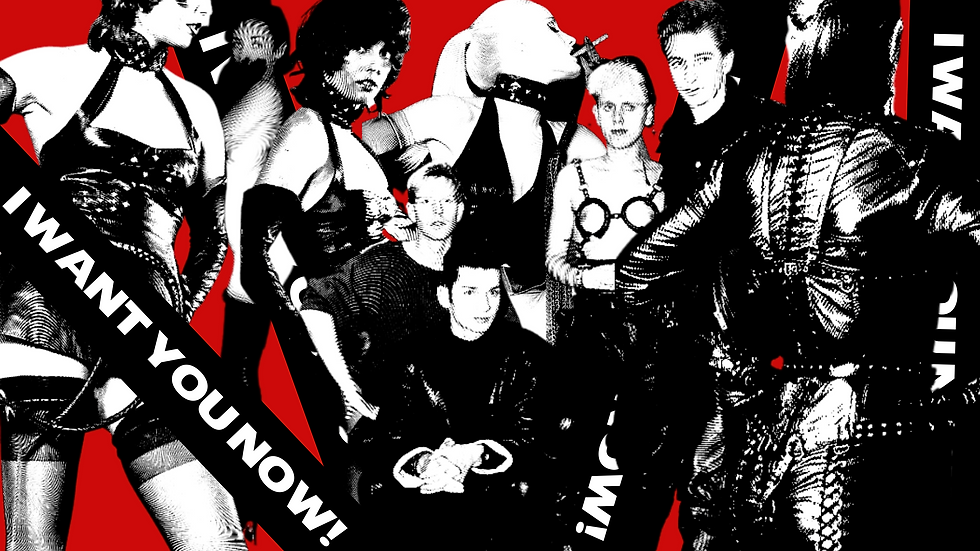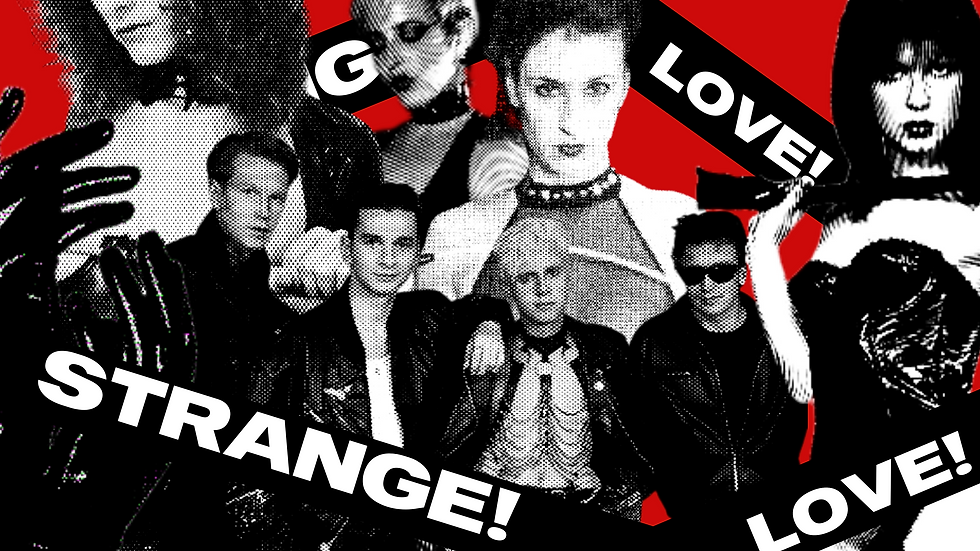It's A Question Of Lust: Depeche Mode and The Ode To The Female Dominant
- Mistrix Violeta Félix

- Jul 1, 2021
- 8 min read
Updated: Jul 14, 2023

It is 1986 in Berlin’s Wiener Strasse, 2:30 a.m. After a night of drinking and clubbing, music journalist Nancy Culp corners Martin Gore in the hallway of the Intercontinental Hotel. She asks the question: “OK, what about the leather then, Martin?” “Yeah.” “Are you really into it?” “Yeah.” “In a sexual way?” He smiles. She eggs him on a bit more. Gore, who was always coy about such matters during interviews, then goes on and says: “I love the idea of wearing black and I love the idea of wearing leather and I love the idea of being tied up, because...” He pauses and laughs. “I love the feeling of helplessness, and that’s the only reason. I’m not really into pain.” Although Gore might have given Culp this response to get her off his back as she clearly demonstrated that night that she just wanted to squeeze a salacious quote from him, one can tell by his songs that it’s not a complete lie. Despite that 1980s music journalists frequently either dismissed or sensationalized the themes of D/s in Depeche Mode’s music, treating it as a silly shock novelty, their lyricism regarding these subjects couldn’t be farther from that. The S&M themes presented in their songs span widely from the parallels between sexual and political submission, the games of a Dominant, switching, fetishism, and much more. When one looks at Depeche Mode’s catalog, it reveals an intricate and profound understanding of submission, even in their more “vanilla” love songs. It’s more than just the leather: it’s the vulnerability, the offering of oneself wholly, the devotion to a higher power that will see through one’s sins and guide them to a higher path. Depeche Mode elevates submission way beyond shock value, and into a religious experience.
Their first song that takes a kinky theme is "Master and Servant", which attracted a lot of controversy and evaded a radio ban by the BBC due to pure chance. Thematically, it was quite a departure from the bubblegum pop and lovesick boy-next-door songs from their first two albums, Speak and Spell and A Broken Frame, and the politically charged, but vanilla, Construction Time Again. This thematic shift didn’t just come from nowhere, though. After recruiting Alan Wilder in 1982, Depeche Mode spent a good amount of time in Berlin where they hung around in the industrial scene, which greatly influenced their upcoming albums both musically and lyrically. Martin Gore has admitted in interviews that their use of industrial sampling and experimental recording methods that were present in both Construction Time Again and Some Great Reward was inspired by Einstürzende Neubauten. At the same time, the 1980s Berlin electronic music scene was definitely a kinky place to be, demonstrated by clubs such as Dschungel where celebrities and fetishists alike congregated. This direct link is still seen today in clubs such as Berghain and KitKatClub.

In the 1980s, the S&M community did not have the amount of reach or resources that it has now in the post-Y2k era of the internet. To get any glance of anything remotely kinky, one had to sneak into the back sections of adult stores and peruse through specialized magazines, catalogs, and personal ads. Professional Dominatrixes from that era will recount how they had to post cryptic ads on billboards, fetish mags, or newspaper personals, await a letter in the mail from a potential sub and then arrange the session through postage mail. The AIDS crisis loomed over like a heavy cloud, especially in the gay leather community. Politically, conservatism was spreading on both sides of the pond, with the Reagan administration in the US and the Thatcher administration in the UK, hellbent on creating white supremacist and heteronormative societies of law, order, and decency. “Master and Servant” was, in all sincerity, a big middle finger. Besides its outward loud and proud embracement of being a slutty bottom, it simultaneously draws parallels with the political environment of the UK of the time: a society where there is no equality, there is always the one on top, while others scour at the bottom; at least within S&M one can turn inequality and exploitation into a vessel of pleasure. However, as one can tell clearly from the controversy that followed afterward, people were more aghast that this song referenced a fringe sexual subculture instead of evaluating systems of oppression. “Master and Servant” was definitely their most on-the-nose S&M-themed song, serving high levels of camp from the lyrics, to the whip sample, to the screaming, to the goofy music video with them rolling around in a bunch of chains.
However, in Black Celebration their content starts to mature, both lyrically and musically. "A Question Of Lust" is one of the signature Martin Gore ballads of the album, which lyrically has a very vulnerable point of view. Though it is not explicitly a song about sexual submission, it can be thematically interpreted as a portrayal of the emotional side of submission. Martin Gore longingly sings about being protected, having all of one’s weaknesses known by their lover, acknowledging how imperfect one is and yet how grateful they are to be cared for by them. In "Dressed In Black" Dave Gahan softly sings over a carnivalesque melody about a mysterious woman dressed in black that stands over him as he lays helplessly. Enshrouded in mystery, she is distant, yet sees completely through him and plays with his mind.
By 1987’s Music For The Masses, the S&M themes really took off. "Strangelove" openly talks about switching, with lyrics such as "Will you give the pain that I give to you again and again?/And will you return it?”, and “I'm not trying to say/ I'll have it all my way/ I'm always willing to learn/ When you've got something to teach”. Right after this, there’s "Sacred", which expresses a deep, spiritual need for unconditional devotion to one’s partner. It passionately expresses about having no choice but to fall to one’s knees after witnessing the beauty of this person, feeling a need to spread the gospel of the magnificence of this divine being that can lead one into salvation. "Behind The Wheel" opens up with the narrator handing himself over on a plate and begging his girl to pull his strings like a puppet. This is followed up by "I Want You Now" which opens with a heavy panting full of uncontrollable desire, for then to beg for sexual release, respectfully, of course. Afterward, there’s "To Have And To Hold", which rounds back to the spiritual themes of cleansing and forgiveness in the hands of a loving partner that holds a somewhat higher position than the narrator. "Pleasure, Little Treasure" ties everything up together by exclaiming that while everybody else is too busy trying to give their lives meaning with banalities such as politics, religion, or parenthood, we should all just find joie de vivre in carnal pleasure.
After Music For The Masses, Depeche Mode sought to properly establish themselves as musical forces to be reckoned with, with album sales to match their ever-growing cult status within the US and overseas. In a December 1990 interview with Select magazine, Martin Gore said:
“We had perfected a formula by then, and it came to fruition on Music For The Masses. But Our sales had become stagnant. We’d sold exactly the same number of albums as [1982’s] A Broken Frame. We realised that if we were going to advance, if we were going to make another record at all, then we would have to change. We needed a new approach, otherwise we wouldn’t have been challenging anything.”
Their seventh album, Violator, proved to be the exact shift they needed. A perfect musical bridge between the synth soundscape of the 80s and the guitar-heavy sound of the 90s, while keeping true to their dark romanticism, it ended up being their most successful album to date.
Another shift in tone can be noted though, which is the position of power within their lyrics. “World In My Eyes” is a deliciously dominant song that sings about taking charge and opening up a partner to sexual realms that they’ve never experienced before. “Personal Jesus” shifts their standard narrative role of the devotee to the confessor, turning them into the divine being who can absolve and cleanse you, the healer, and the fetish. “Halo” works as a thematic reprise of “Personal Jesus”, which recounts a significant other going through a period of personal despair and vulnerability, and opening one’s arms in acceptance and support, establishing again the narrator’s position as caretaker and healer. But then, we have “Blue Dress” and the narrative tone shifts back to a submissive one. “Blue Dress” is a fetishist theme song, with the narrator begging their partner to “put it on”, saying that they don’t have to even touch it, they just want to look at their partner wearing the unspecified garment, and in doing so it brings the narrator immense joy and satisfaction (side note-- even Martin Gore called this song pervy).

By now one can notice that a very common recurring theme in Depeche Mode’s songs is faith and devotion, so logically, their next album would be called Songs Of Faith And Devotion. In this record, the overarching religious theme expands beyond its lyricism and is reflected in the sound of the album with gospel influences, a string orchestra, and a monumentally-sounding production that makes one feel as if one is in a cathedral. At the same time, in the classic Depeche Mode fashion, the holy is interposed with the erotic. The opening track, “I Feel You”, is an epic that sings about how glorious it is to have sex, full of allusions to angels, Babylon, and the Kingdom of Heaven. “In Your Room” demonstrates a pretty overt theme of sexual submission, the narrator describing himself as a sensual object to be used by his partner, awaiting for Her next command. He describes himself as Her favorite prize, game, and slave, feeling through her senses, hanging on her words, wondering if she will “let the morning come soon” or leave him lying there. To top it off, the music video shows the members bound to a chair with leather bondage cuffs. “One Caress” brings again the element of falling on one’s knees and seeking blessings and absolution through a higher Other, which is, of course, his partner. He expresses how he wants to be led into Her darkness, and live there eternally as he acknowledges that sin can make him a better man. The album closes with “Higher Love” bringing a grandiose climax when it comes to proclamations of submission in this album. Dave Gahan’s voice seeps with desire and desperation, which elevates the lyrics that talk about surrendering all control, offering oneself as a sacrifice, and being bound by desire, all to a “higher love”.
Consider the themes of S&M in Depeche Mode’s music as a wave. If “Master & Servant” was the beginning, Black Celebration was the rise, and Music For The Masses its peak. Soon after, the kinky themes start waning down a bit by Violator, but especially after Songs Of Faith And Devotion. Looking at what was going on behind the scenes, one can tell why: Dave Gahan’s drug addiction was worsening at an alarming rate, leading to two brushes with death. Martin Gore’s alcoholism was also getting more severe and he was accumulating so much stress that he started to have seizures. Andy Fletcher had a full mental breakdown, and Alan Wilder left the band after having so much accumulated tension during the production of Songs Of Faith And Devotion. Having gone through all of these experiences together, by Ultra their lyrics start shifting more into an introspective turn, abandoning the songs that were seeping with raw, horny, kinky energy. That is not to say that the themes of submission and dominance have completely abandoned their music, as one can still hear references here and there from their more current work such as the songs “In Chains” from their 2009 album Sounds Of The Universe and “Soothe My Soul” from 2013’s Delta Machine.
With all of that said, one can see why Depeche Mode remains a beloved favorite amongst the S&M community. Besides their sexy sound and affinity to leather, Depeche Mode’s lyricism interposed sexuality with the divine, adding poeticism to the act of sexual submission. To them it’s more than just a game, it’s so much more: it’s a higher love, it’s dressed in black, it’s sacred, it’s a strange love. All in all, whatever face it takes, it’s always about opening oneself whole, devoted to a higher being, and simply giving in.


